Related Research Articles
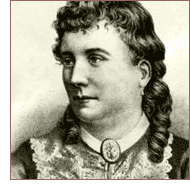
Mary Elizabeth Braddon was an English popular novelist of the Victorian era. She is best known for her 1862 sensation novel Lady Audley's Secret, which has also been dramatised and filmed several times.

Lady Audley's Secret is a sensation novel by Mary Elizabeth Braddon published in 1862. It was Braddon's most successful and well-known novel. Critic John Sutherland (1989) described the work as "the most sensationally successful of all the sensation novels". The plot centres on "accidental bigamy" which was in literary fashion in the early 1860s. The plot was summarised by literary critic Elaine Showalter (1982): "Braddon's bigamous heroine deserts her child, pushes husband number one down a well, thinks about poisoning husband number two and sets fire to a hotel in which her other male acquaintances are residing". Elements of the novel mirror themes of the real-life Constance Kent case of June 1860 which gripped the nation for years. Braddon's second 'bigamy' novel, Aurora Floyd, appeared in 1863. Braddon set the story in Ingatestone Hall, Essex, inspired by a visit there. There have been three silent film adaptations, one UK television version in 2000, and three minor stage adaptations.

Katherine Seymour, Countess of Hertford was a younger sister of Lady Jane Grey.

Thomas Howard, 4th Duke of Norfolk,, was an English nobleman and politician. He was a second cousin of Queen Elizabeth I and held many high offices during the earlier part of her reign.

Sir Alexander Bannerman was a Scottish merchant, vintner, politician and British colonial governor.

Thomas Howard, 1st Earl of Suffolk,, of Audley End House in the parish of Saffron Walden in Essex, and of Suffolk House near Westminster, a member of the House of Howard, was the second son of Thomas Howard, 4th Duke of Norfolk, by his second wife Margaret Audley, the daughter and eventual sole heiress of Thomas Audley, 1st Baron Audley of Walden, of Audley End.

Frances Carr, Countess of Somerset, was an English noblewoman who was the central figure in a famous scandal and murder during the reign of King James I. She was found guilty but spared execution, and was eventually pardoned by the King and released from the Tower of London in early 1622.
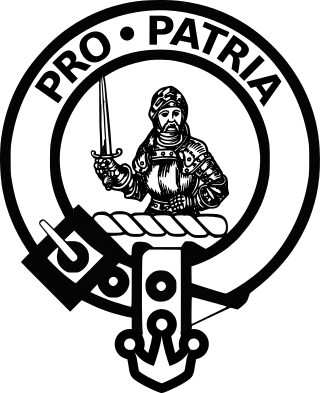
Clan Bannerman is a Lowland Scottish clan.

William Farquhar was a Scottish colonial administrator employed by the East India Company, who served as the sixth Resident of Malacca between 1813 and 1818, and the first Resident of Singapore between 1819 and 1823.
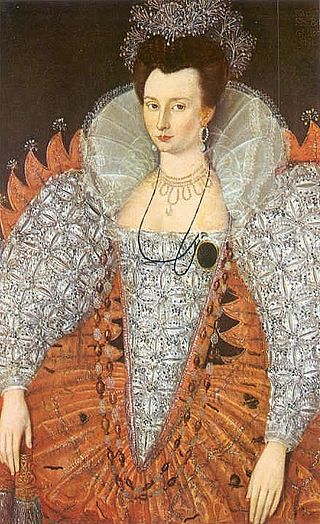
Mary Fitton was an Elizabethan gentlewoman who became a maid of honour to Queen Elizabeth. She is noted for her scandalous affairs with William Herbert, 3rd Earl of Pembroke, Vice-Admiral Sir Richard Leveson, and others. She is considered by some to be the "Dark Lady" of Shakespeare's sonnets.
Sir Jocelyn Edward Greville Stevens, was the publisher of Queen magazine and a London newspaper executive.
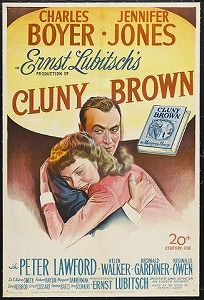
Cluny Brown is a 1946 American romantic comedy film made by Twentieth Century-Fox starring Charles Boyer and Jennifer Jones. It was directed and produced by Ernst Lubitsch following a screenplay written by Samuel Hoffenstein and Elizabeth Reinhardt based on the 1944 novel by Margery Sharp. The music score is by Cyril J. Mockridge. The film is a satire on the smugness of British high society and the last film Lubitsch completed before his death in 1947.

The Stanley family is an English family with many notable members, including the Earls of Derby and the Barons Audley who descended from the early holders of Audley and Stanley, Staffordshire. The two branches of the Audley family were made Barons Audley but both ended in the male line in the 14th century, after which their considerable estates were passed to a number of female heiresses, while the Stanleys would be elevated in the 15th century first to Barons Stanley and then Earls of Derby, a title they continue to hold.

The Ware Case is a 1928 British silent drama film directed by H. Manning Haynes and starring Stewart Rome, Betty Carter and Ian Fleming. The film was shot at the Twickenham Studios in London with sets designed by the art director Hugh Gee. It was an adaptation of the play The Ware Case by George Pleydell Bancroft, previously filmed in 1917, with another version appearing in 1938. First National distributed the film in the United States.

Margaret Bannerman was a Canadian actress. She is known for her work in the English films The Gay Lord Quex, Lady Audley's Secret and Hindle Wakes. She had a successful career on stage, appearing in revues and light comedy.

A statue of Margaret Thatcher, the first female prime minister of the United Kingdom, stands in the Members' Lobby of the Houses of Parliament in London. It is a bronze sculpture of Margaret Thatcher, the first female Prime Minister of the United Kingdom. It was commissioned in 2003 following a change in rules to allow the depiction of living prime ministers in Parliament under certain conditions. The bronze statue, sculpted by Antony Dufort, was unveiled on 21 February 2007 by Michael Martin, Speaker of the House of Commons, with Thatcher in attendance.
Margaret II Audley was a co-heiress to the feudal barony of Barnstaple in Devon, England.
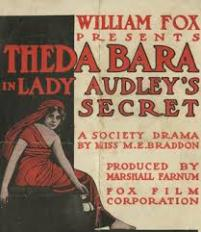
Lady Audley's Secret is a 1915 American silent drama film directed by Marshall Farnum and starring Theda Bara, Riley Hatch and Clifford Bruce. It was an adaptation of the 1862 British novel Lady Audley's Secret by Mary Elizabeth Braddon. It is now considered a lost film. The film was less successful than Bara's other films of the period, because it did not feature her in the wildly popular vamp role she had established.

Lady Margaret Sackville, formerly Lady Margaret Howard, was the wife of Robert Sackville, 2nd Earl of Dorset.
John Mills (c.1670–1736) was a British stage actor. A long-standing part of the Drury Lane company from 1695 until his death, he appeared in both comedies and tragedies. His wife Margaret Mills was an actress, and his son William Mills also became an actor at Drury Lane.